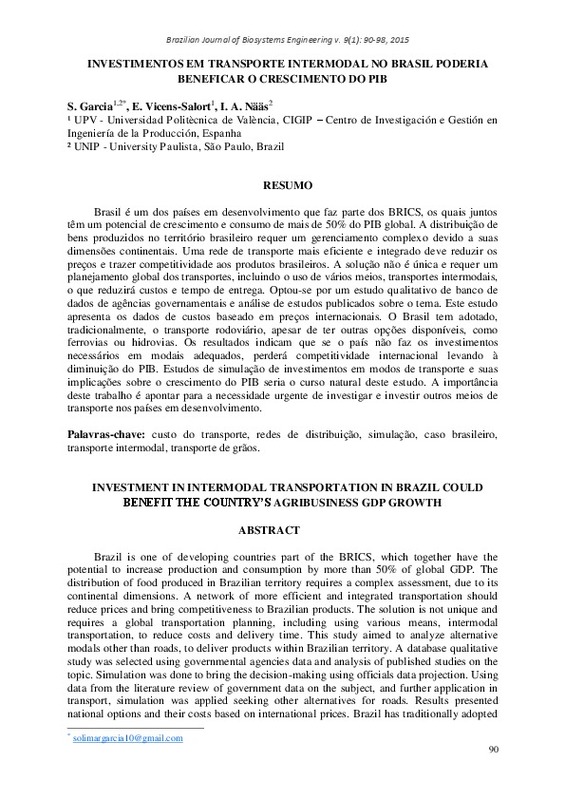|
Resumen:
|
[PT] Brasil é um dos países em desenvolvimento que faz parte dos BRICS, os quais juntos
têm um potencial de crescimento e consumo de mais de 50% do PIB global. A distribuição de
bens produzidos no território brasileiro ...[+]
[PT] Brasil é um dos países em desenvolvimento que faz parte dos BRICS, os quais juntos
têm um potencial de crescimento e consumo de mais de 50% do PIB global. A distribuição de
bens produzidos no território brasileiro requer um gerenciamento complexo devido a suas
dimensões continentais. Uma rede de transporte mais eficiente e integrado deve reduzir os
preços e trazer competitividade aos produtos brasileiros. A solução não é única e requer um
planejamento global dos transportes, incluindo o uso de vários meios, transportes intermodais,
o que reduzirá custos e tempo de entrega. Optou-se por um estudo qualitativo de banco de
dados de agências governamentais e análise de estudos publicados sobre o tema. Este estudo
apresenta os dados de custos baseado em preços internacionais. O Brasil tem adotado,
tradicionalmente, o transporte rodoviário, apesar de ter outras opções disponíveis, como
ferrovias ou hidrovias. Os resultados indicam que se o país não faz os investimentos
necessários em modais adequados, perderá competitividade internacional levando à
diminuição do PIB. Estudos de simulação de investimentos em modos de transporte e suas
implicações sobre o crescimento do PIB seria o curso natural deste estudo. A importância
deste trabalho é apontar para a necessidade urgente de investigar e investir outros meios de
transporte nos países em desenvolvimento
[-]
[EN] Brazil is one of developing countries part of the BRICS, which together have the potential to increase production and consumption by more than 50% of global GDP. The distribution of food produced in Brazilian territory ...[+]
[EN] Brazil is one of developing countries part of the BRICS, which together have the potential to increase production and consumption by more than 50% of global GDP. The distribution of food produced in Brazilian territory requires a complex assessment, due to its continental dimensions. A network of more efficient and integrated transportation should reduce prices and bring competitiveness to Brazilian products. The solution is not unique and requires a global transportation planning, including using various means, intermodal transportation, to reduce costs and delivery time. This study aimed to analyze alternative modals other than roads, to deliver products within Brazilian territory. A database qualitative study was selected using governmental agencies data and analysis of published studies on the topic. Simulation was done to bring the decision-making using officials data projection. Using data from the literature review of government data on the subject, and further application in transport, simulation was applied seeking other alternatives for roads. Results presented national options and their costs based on international prices. Brazil has traditionally adopted road transportation, and other options are available, as railways or waterways. Results also indicate that if the country does not make the necessary investments in adequate modals, it will lose international competitiveness leading to decrease in the GDP. Include simulation studies on investments in modes of transport and its implications on GDP growth would be the natural course of this study. The importance of this study is to point out the urgent need to investigate and invest other means of transport in developing countries
[-]
|









